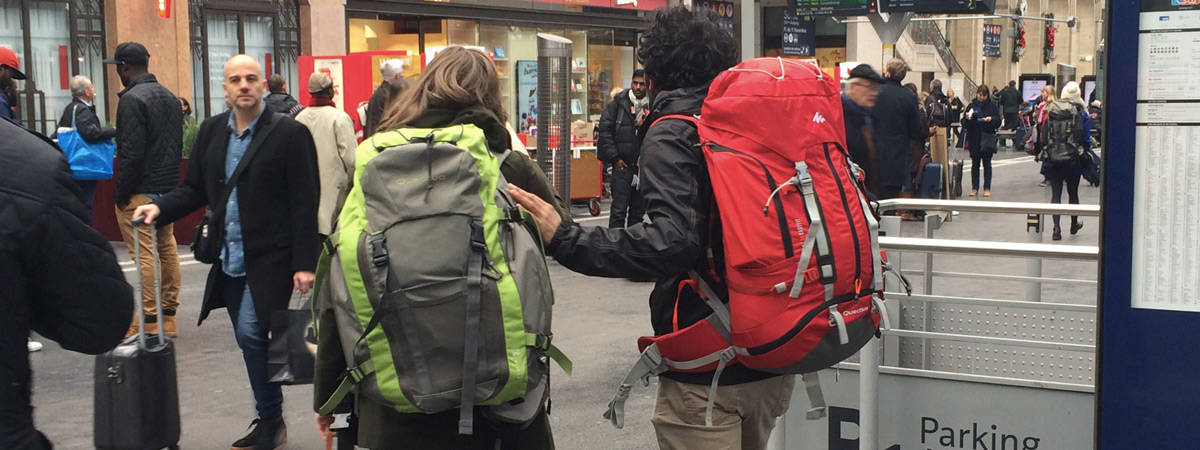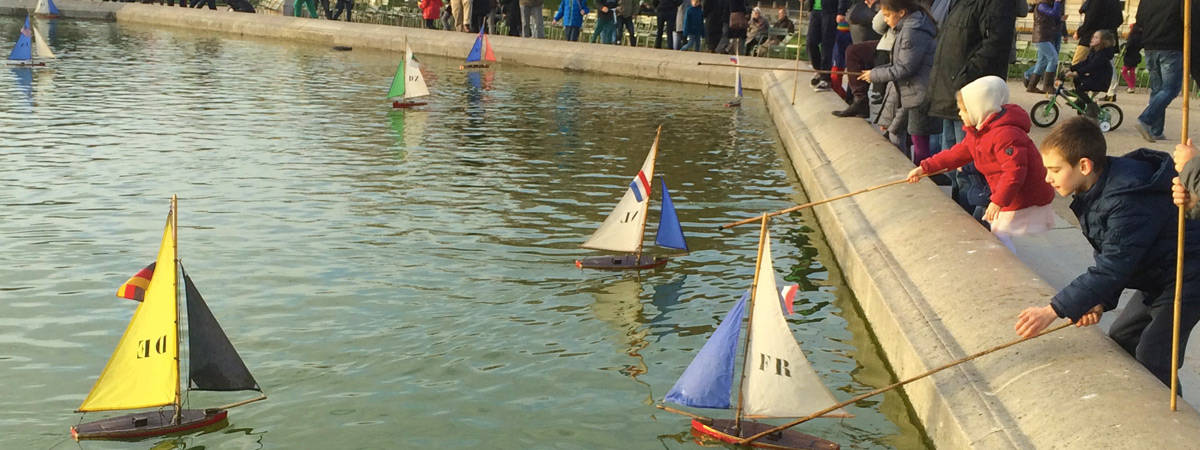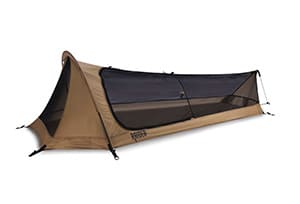
How cheaply can you travel through Europe? $50/day? What about $30/day? Or could you do it for under $20/day? What about less? It’s certainly possible, but it’s far from easy… but you’re in luck because we’re pulling out all the stops and throwing together our most extreme money-saving travel tips.
But first, let me be honest. I’ve hesitated on writing this post for almost a year because of the fact that extreme-budget travel, especially in Europe, is really damn tough. I don’t want to sugarcoat the truth because ultra-budget travel gets romanticized — which gives readers a false hope that “roughing it” through Europe will be no problem. And this leads to people running out of money 1/4 of the way through their trip.
So yeah, it’s tough. It’s exhausting. It’s uncomfortable. It’s time-consuming. It can be a bit dangerous. You’ll miss out on experiences. And the less you spend, the tougher it gets. But it is possible — and a lot of people do it. I just want to be 100% clear about the downsides and difficulties because we here at The Savvy Backpacker are firm believers in giving you all the information you need to make an informed choice.
Starting Your Travel Fund

The first step is to save some damn money. I’ve written a huge guide about how to start your travel fund that has all kinds of tips, advice, and strategies for building up your travel nest egg.
Getting to Europe
Physically getting to Europe is going to be your single biggest expense. Tickets can cost anywhere from about $600-$1400+… that’s pretty rough if you’re broke.
So let’s see what we can do to help take the sting out of buying a plane ticket.
Credit Cards with Travel Bonuses
The only real way to travel to Europe super cheaply is by using airline points/frequent flyer miles. And the airlines seem to get stingier each year, so this method keeps getting less practical. However, people still go crazy trying to find ways to rack up as many frequent flier miles as they can, and they spend hours and hours looking for loopholes. There are even some people that take flights for the sole purpose of racking up points. Just about every deal/scheme is discussed on the Flyer Talk Forum.
That said, the fastest way to rack up these points is by signing up for a credit card that comes with a large airline miles bonus. The cards with the biggest bonuses usually require you to spend around $3,000 on the card within the first three months to earn somewhere between 40,000-60,000 bonus miles. For reference, a flight from the US to London will cost about 60,000-120,000 miles (each airline and card figures these numbers a little differently). Also, remember that these cards come with a yearly fee of around $95.
So there is a good chance you won’t have enough miles to buy a ticket. That means you’ll have to earn more miles by using your card to purchase things. Most cards offer 1 mile for every $1 spent, so you’ll have to spend a lot on your card to rack up enough bonus miles. But it’s certainly possible, and some cards have special bonuses when you spend money on certain categories. I just wish I could pay my rent and student loans with my card!
Buying Cheap Flights the Old Fashioned Way
If a travel credit card isn’t right for you, you’ll have to focus on ways to find the cheapest flight possible.
First, check out our Guide to Buying Cheap Airfare to Europe. This has a lot of good information to help you find the best deals. Here are the most important highlights:
- Travel Off-Season: You’re going to pay a lot if you travel during the summer. There are still ways to save on summer travel, but the biggest savings is going to come from traveling during the off-season.
- Be Flexible with Dates and Airports: Adjusting your flight dates by a few days can save you hundreds of dollars. Similarly, flying into different airports can also make a big difference. The best way to find prices is by heading over to Google Flights, Sky Scanner, and Kayak and then trying a different date and airport combos. It’s not an exact science, so you just have to mess around with it until you find the best option; luckily, all three of those sites have search tools which make this process a little easier.
- Wow Airlines and Other Budget Carriers: WOW Airlines is an Icelandic airline that made headlines by offering $99 flights from the US to Iceland. That was for a limited time of course, but they still offer cheap flights from a few US cities to Iceland and a few other European cities (I just did a quick search and found a one-way from DC to Iceland for $270 in early May). Anyway, more and more budget airlines have announced that they’re starting routes between the US and Europe. You just have to keep your eyes open and be ready to jump on these cheap fares as soon as you hear about them.
- Take Undesirable Flights: Sometimes the cheapest flights are the most undesirable. For example, I was looking for a flight from NYC to Paris and the cheapest options had a layover in Istanbul or Moscow. For those of you who aren’t great at geography, both Istanbul and Moscow are wayyyy far away from Paris, so you’re adding on a ton of travel time. I ended up spending $100 more to get a non-stop ticket (but I saved something like 20 hours of travel time). However, if you’re traveling on an extreme budget, that extra $100 can go a long way.
- Scott’s Cheap Flights: Scott’s Cheap Flights is an email newsletter that sends out daily cheap flight deals. This is best for people who are super flexible with their travel dates. I’ve found rount trip tickets to Paris/London/Rome from NYC for as low as $400 There is a free and a premium version so check them out or read our review here.
Finding Cheap/Free Accommodation

Ok, so you made it to Europe. Great! Now it’s time to find ways to cut accommodation costs, which, for most people, ends up being their greatest travel expense. In Western Europe, you’re probably going to pay anywhere from $20-$35/night for the cheapest hostel bed, so cutting all accommodation costs for an entire month could save you anywhere from $600-$1000.
Luckily, you have a few good options, and while it won’t always be easy, it’s certainly possible to drastically slash your accommodation costs. Are you up for the challenge?
Couchsurfing
Couchsurfing is the best option for all you cheapo travelers. We’ve used it multiple times, and it works surprisingly well. Ironically, it works so well that Couchsurfing has become a victim of its own success… it turns out that so many people like the idea of sleeping for free that local hosts get inundated with guest requests.
First off, read our Guide To Couchsurfing — it will help make the entire process much easier. We’ve listed some of the most important advice below:
You need to be an active member of the Couchsurfing community if you plan to rely on the service as your primary means of accommodation. If you can, start hosting people now. Those guests will leave feedback saying that you were a good host. Then, when you reach out to hosts in Europe, they’ll see that you are a host yourself, and you’ll stand out from the hundreds of people using Couchsurfing as nothing more than a free hotel. If nothing else, try Couchsurfing a time or two before you depart because a lot of hosts would rather host people with a bit of experience.
Sometimes hosts will make you a meal, but I wouldn’t count on it. If they do, you might want to chip in a little to help make the meal.
Stay with Friends and Family
Don’t be shy. Reach out to friends, friends of friends, and long-lost family members. Most people are more than happy to have you stay for a few days — just don’t overdo it. As a bonus, they might feed you as well.
Parks, Train Stations, Beaches, and Other Uncomfortable Spots
If you’re desperate, you can always try your luck sleeping for free in train stations, parks, beaches, and anywhere else you think you might be able to get away with it. This works best in the summer so you don’t have to deal with cold weather.
But let’s be real… sleeping like this isn’t enjoyable, and in some cases it’s illegal. Some train stations are open 24/7, but some close for a few hours in the early morning so they’ll kick you out. It’s illegal to sleep in most parks and on some beaches, but sometimes the police will leave you alone if you aren’t causing any problems and if you’re out of sight.
For your comfort, you might want to invest in a sleeping pad because sleeping on a cold, wet floor sucks (trust me). You can find a bunch on Amazon for anywhere from about $10-$40. You might want to also get a lightweight sleeping bag.
Sleeping in these situations does put you and your belongings at risk, so this might not be advisable for solo travelers. Either way, make sure to secure your belongs so someone can’t snatch them while you’re sleeping. We recommend a cable lock as a way to secure your bag to yourself or to an immovable object.
Camping
There are basically two types of camping — legal and illegal. Legal camping is done at designated campgrounds, which exist all across Europe. You usually have to pay a bit of money to reserve your spot, but it can be free to camp on some public land (it depends on the local laws). The main issue with this is that campgrounds are usually located away outside the city, and public transport to get there may not exist. So this may not be practical, or even possible, option unless you have a car. Additionally, campgrounds can charge anywhere from a few dollars up to $30-$40 to reserve a spot, so it may not be much cheaper than staying in a hostel.
Illegal/stealth camping is camping on public land (like parks) or on private property without getting permission. As I mentioned before, sometimes the police don’t really care if you camp in the parks as long as you’re out of sight. Personally, I’d be more worried about the other people milling around the in the park late at night (i.e. drug dealers, prostitutes, and other bad guys) than the police.
Don’t forget camping gear. Whether you do it legally or illegally, you’ll need the proper gear. First, you’ll want a tent (Amazon is probably your best bet). We recommend getting a low-profile bivy tent if you plan on stealth camping. Get a dark color or a dark-colored cover so you don’t stand out. These types of tents will run you about $100-$200 on Amazon. We recommend finding a lightweight tent since it will be easier to carry around (but they’re more expensive).
Next, you’ll want a sleeping bag. Amazon sells them for anywhere from about $35-$200+. Make sure to get one that will be comfortable for the temperatures you’ll be sleeping in. Again, if you can afford it, think about getting a lightweight sleeping bag that compresses well so it won’t take up a lot of space. A sleeping pad will also help your overall comfort.
Of course, you’ll need somewhere to store your backpack and camping gear during the day (never try to just hide it). Check out train stations, which usually have luggage lockers. If that doesn’t work, try getting a hostel to store your bag (just tell them you’re staying there… I doubt they’ll ask any questions).
Hostels
If you’re looking to travel for practically free, then hostels might be out of your price range. But this is your best bet if you’re out of other options. Remember, never sacrifice your safety to save a few dollars. However, if you’re traveling in Eastern Europe, you might consider hostels since they’re super cheap anyway. We recommend HostelWorld for booking hostels.
Other Nontraditional Ways to Travel for Free
Become an Au Pair
Becoming an au pair (which is basically a nanny) is another great option if you want to live in Europe for an extended amount of time — of course, you’ll be working, so you won’t be able to travel all the time. The nice thing about being an au pair is that your host family may give you free housing, free food, and language lessons in addition to the pay. This isn’t always the case, but it’s fairly common. And au pairing isn’t just for females; some families specifically seek out guys.
Additionally, a lot of countries have special Au Pair visas, so you could be able to stay over the three-month limit.
Volunteer (WWOOF, HelpX, etc.)
Many farmers in Europe need extra assistance during certain times of the year, so they get volunteers to help. They can’t legally pay you, but they can provide room and board. Volunteering can last anywhere from a few days to a few months (as long as you don’t overstay your visa). WWOOF and HelpX are the two biggest resources for finding volunteer opportunities.
Teach English
Susan spent seven months in northern France teaching English to high school students. The program is put on by the French government, so she got paid and only had to work about 12 hours a week. She also got super lucky by getting free housing (which is fairly rare). She used her long weekends to travel around Europe. I know both France and Spain have these programs, but other countries may have them too. You usually have to speak some of the local language, but not always.
Eating for Cheap

Okay, so you’ve got your accommodation covered… now you need to eat.
Unless you’re traveling in super cheap countries, eating at restaurants is pretty much out of the question. That means making your own food.
If you’re dedicated to eating cheaply, you can easily spend less than $10-$15/day on food. In Eastern Europe, you can do it a lot cheaper.
Grocery Stores

It’s no surprise that fixing your own meals will be your cheapest option. I actually enjoy grocery shopping when I travel because it’s a cultural experience and I think it’s fun looking at the different foods on the shelves.
For the most part, you’ll find much of the same food in European grocery stores as you see back home. Space is at a premium in Europe, so expect smaller stores and less variety than you’re accustomed to. Also be aware that most grocery stores close around 8:00 pm, and many are closed or close around noon on Sundays. Only small convenience stores will be open late, but their prices are higher.
Each country has budget grocery stores, so do your research to figure out where to get the best deals.
If you’re staying at a hostel that has a kitchen, remember that you’re still limited in the types of meals you can prepare since you won’t have a lot of storage/fridge space for your food. Try purchasing just enough ingredients to make a meal or two. It does take a little extra time and planning, but the cost savings can be worth the effort.
Another good option is to gather a bunch of people together at the hostel and make a big meal. This is a great way to make friends and the price per person is really low if you get a lot of people to chip in for the meal.
If you’re on the go or don’t feel like cooking a meal, you’ll be able to buy prepared sandwiches, wraps, and salads that range from about $4-$9 at most grocery stores. Some shops have special deals where you can get a sandwich or salad with a dessert/fruit and drink for around $8-$12.
Farmers’ Markets
The best fruits and vegetables are normally found at farmers’ markets. Luckily, you’ll find a farmers’ market in just about every city. Additionally, the quality of food you’ll find there will be light-years ahead of the stuff in the grocery store.
A money saving trick is to wait until the market is starting to close because some stalls will discount their goods. Some of the stalls might be picked over, but there will nearly always be more than enough since you won’t be purchasing very much anyway. You should also shop around because different vendors will have different prices.
 Greengrocers
Greengrocers
Another great place to find high-quality, fresh produce is at greengrocers. You’ll find these shops scattered throughout the city, and they’ll be open most days of the week — and they’ll hold regular hours.
Restaurants and Eating Out
Let’s be honest, you’re probably going to eat out a few times. If so, your best bet is ethnic food (Chinese, Thai, Indian, etc.) or street food like kebabs. Also, check out bakeries for cheap and filling sandwiches.
Sightseeing on a Budget

So now it’s time to fill your days…
In general, museums in Europe aren’t exactly cheap, so if you’re trying to only spend a few dollars a day, you might have to just admire the exterior of the museum.
Almost every museum has at least one free day each month. Of course, this will rarely line up with your schedule, but it doesn’t hurt to do a bit of research. Some museums also have a cheap night once a week, so that’s another option.
Some museums are free to university students, but this is often limited to EU students only. It doesn’t hurt to try if you have a non-European ID, but don’t be surprised if you get turned away.
Of course, walking around the city is a great way to sightsee for free.
Transportation on an Extreme Budget

Transportation can be a killer to any budget, so the easiest way to cut your transportation budget is by changing locations less often. Plus, spending more time in each location gives you a better chance to explore.
Hitchhiking
The cheapest and most frustrating way to travel between cities is hitchhiking. It’s actually fairly common in some parts of Europe, and in other parts, it’s not common at all. I’ll be the first to tell you that I’m not an expert in this area, so I’ll refer you to HitchWiki, which has a ton of great information.
Ride Sharing
Ride sharing has taken off over the past few years, and while it isn’t free, it is a cheap way to travel. BlaBlaCar is the best service to help you find a ride share. It’s a pretty simple service — you search for your route and the site shows you drivers who are making the same journey. Then you see how much the driver is charging. You can then book the ride if you like.
Driving
Driving can be a good value if you want to travel to small towns and villages, especially if you’re traveling with multiple people. Driving also makes camping easier, so you might be able to save money on accommodation. Here are some tips about driving and renting cars in Europe.
Long-distance Coaches
Taking the bus is usually the cheapest mass transit option. We’ve written a guide on long-distance coach travel in Europe that you might want to look at. The main issue is that buses are slow and uncomfortable, so they’re not ideal for really long trips.
 The Train
The Train
The train can get expensive, but sometimes there are sales and if you book really early, you can find some good deals. Finding the best deals is a little tricky, so we recommend checking out our guide to traveling by train in Europe.
Budget Flights
You can actually get some super cheap flights within Europe. I once got a flight from London to Glasgow for about $2 via Ryanair. If you get lucky, you can find some flights for under $20. At these prices, it doesn’t make sense not to fly. Of course, don’t expect all your flights to be this cheap, but you can find some really good deals if you do some searching. SkyScanner is the best site I’ve found when it comes to finding European flights on budget airlines.
Other Budget Travel Advice
Go East, My Friend. Eastern Europe (and some parts of Southern Europe) is much cheaper than Western Europe.
Off-Season Travel. Airfare and accommodation are cheaper if you travel in the winter. Prices go up a bit during the spring and fall, but it’s still cheaper than the summer.
Travel in Groups (Sometimes). Traveling in a group can often help cut costs. For example, splitting a car rental between four people helps cut the per-person cost drastically. Similarly, if you squeeze four people into a small rental apartment, it ends up costing about the same as a hostel. On the other hand, trying to couch-surf with a group is sometimes more difficult.
Do Your Research. There are always deals to be found on restaurants and sightseeing, but you have to seek them out.
Research ATM Fees. Be smart with your money by finding a bank that doesn’t charge ATM fees. If you can’t find one, make sure you withdraw money smartly because you don’t want to rack up a bunch of withdrawal fees. Here is an article about using money smartly in Europe.
Avoid Overtipping. If you’re American, you’re used to tipping. In Europe, many times the gratuity is already included in the bill, so tipping isn’t customary. If it is customary where you’re traveling, the amount you tip is only around 10%.
Walk. Public transportation is usually affordable, but walking is always free.
So Go Travel, Cheapass
So what do you think? Are you up for traveling through Europe on a shoestring budget? Hell yes, you are.
Packing Help
Check out these helpful articles for tips and advice for packing for your trip.
Backpacking Europe Packing List For Women
Backpacking Europe Packing List For Men
Best Travel Backpacks For Europe
- Guide To Using Smartphones, SIM Cards, and Data Plans In Europe - August 2, 2025
- Backpacking Europe Packing List — My Europe Travel Packing Guide - July 26, 2025
- The Best Travel Backpacks | In-Depth Buyer’s Guide & Backpack Reviews - July 5, 2025

No Funny Business
The Savvy Backpacker is reader-supported. That means when you buy products/services through links on the site, I may earn an affiliate commission—it doesn’t cost you anything extra and it helps support the site.
Thanks For Reading! — James
Questions? Learn more about our Strict Advertising Policy and How To Support Us.



 Greengrocers
Greengrocers The Train
The Train


